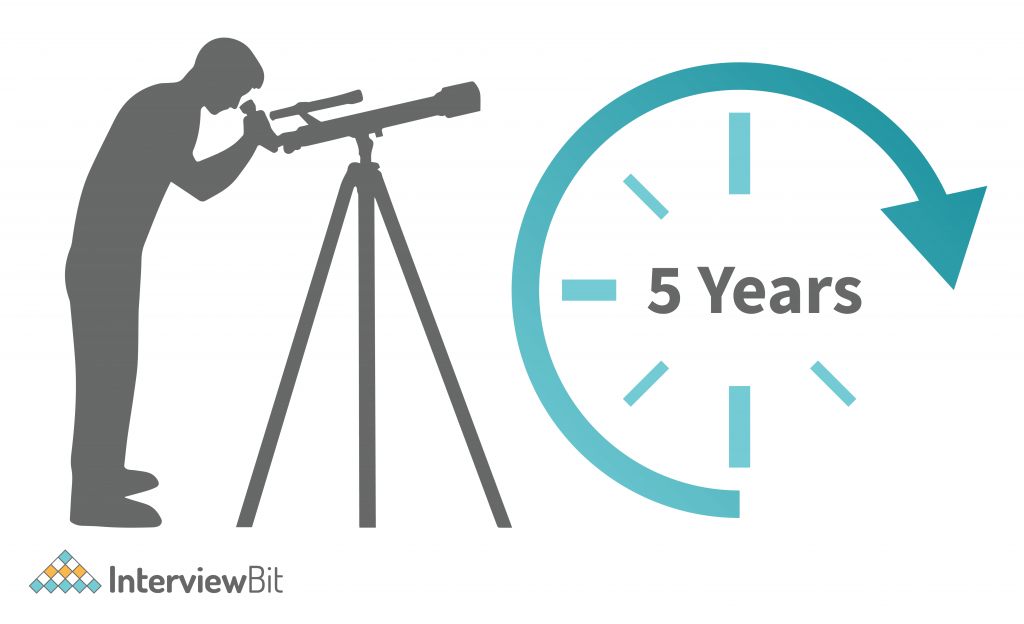- Introduction
- Why do Interviewers Ask “Where Do You See Yourself in 5 Years?”
- How to Give the Perfect Answer to “Where Do You See Yourself in 5 Years”
- 1. Setting the Career Goals:
- 2. Interconnect Job Description and Job Role:
- 3. Organizational Support:
- Where Do You See Yourself in 5 Years Sample Answer
- Answers To “Where Do You See Yourself In 5 Years?” That You Should Avoid
- 1. Answers that show you haven’t thought about your future yet:
- 2. Answers that show you’ll be leaving the company soon for a better opportunity:
- 3. Answers that are too generic:
- Conclusion
- Important Resources
Introduction
Human aspirations are a direct result of growing needs and the ability to sustain themselves in the changing world. Technology has emerged as a prime employer for new generation employees. The motivation for the job change is driven by the long-term goals of stability and higher profitability. Employees often were faced with the question “Where do you see yourself in 5 years?” whenever they try shifting jobs.
If you’ve ever had the misfortune of being asked this question, then you know how difficult it can be to answer this. You’re expected to envision your future in a single sentence without making it sound totally false, right? Well, don’t worry. This post will walk you through a method for answering this question, complete with an example answer.

Why do Interviewers Ask “Where Do You See Yourself in 5 Years?”
Interviews are often conducted in a group setting wherein more than one interviewer was involved. The interview panel depicts the organizational strength by placing experts in the position of the job vacancies. When an interviewer asks “Where do you see yourself in 5 years?” from the applicant, it signifies the aspiration of the interviewer to know about the dedication of the employee to the new organization.
Confused about your next job?
The interviewer gauges the applicability, versatility, and relevancy of the new applicant for the desired role. Based on the answer given, the interviewer can gauge the dedication of the applicant regarding the career goals by giving a specific period of 5 years to help the interviewer understand the immediate priorities of the applicant. Applicants’ answer to the question reveals the satisfaction level of the applicant for the job role and helps the interviewer inspect the level of hard work the applicant will be able to put in to stay as long as possible with the new organization.
The aim of the interviewer here is to seek the acceptability of the applicant for the job role resulting in the maximum benefit from the work the employee will put in for the organization. The interviewer’s aim to ask the question of the applicant is to fill the job role with the most dedicated and mentally stable employee that would result in the long-term benefit of the organization. An applicant failing to answer would simply show that the applicant is not the best fit for the job role and the interviewer shall be searching for the ideal candidate again.
How to Give the Perfect Answer to “Where Do You See Yourself in 5 Years”
The answer to the question raised is about seeking to visualize them in an organization that not only empowers the employees but also looks for their health and wellbeing, social growth, and family support. The growth in software development is increasing by leaps and bounds and thereby providing varied opportunities to trained professionals. Employees ponder over the question “Where do you see yourself in 5 years?” beforehand to show preparedness for the interview and portray that software engineers are ready to move on to the next organization with a clear focus and planning.
Preparation for “Where Do You See Yourself in 5 Years” in a perfect manner is not an easy task. On the part of the applicant, it requires a focused approach and a thorough understanding of how life will change in the next five years. Sometimes, an applicant is struggling with the existing job responsibilities or in pressure from family responsibilities. The peer pressure of securing a dream job also drives the applicant’s motivation to think about the answer to the question. Software and technology development jobs are lucrative outside the country as well, hence, an applicant who wants to secure a job in Silicon Valley in the coming years must consider that goal in hindsight while preparing for the perfect answer that he/she wants to secure a foreign-based opportunity.
Answering the question is linked with the human willingness and approach towards the work wherein the long-term goal-setting process is utilized by the employees and through effective communication, employees convince the hiring managers with a clear explanation of where they would be after five years from now.
The applicant needs to answer perfectly about the motivation for the next five years. To answer “Where do you see yourself in 5 years?” an applicant must prepare in a stepwise manner to answer and express the will concerning the organizational requirements as well as personal competencies. The preparation to answer perfectly can be elaborated on below given points:

1. Setting the Career Goals:
The applicant should understand the job profile and organizational structure before applying and following that, he/she must set career goals for at least five years in the future. The applicant also needs to enhance their skills and knowledge as per the new job responsibility.
If you’ve ever had the misfortune of being asked, “Where do see yourself in 5 years?” then you know how difficult it can be to answer this question. You’re expected to envision your future in a single sentence without making it sound false, right? Well, don’t worry. This post will walk you through a method for answering this question, complete with an example answer.
2. Interconnect Job Description and Job Role:
it is a must to understand the exact job responsibilities and work profile within which the organization is working. Organizational growth charts will be integral to preparing for the interview. The existing skill set of the applicant must be reflected when answering the “Where do you see yourself in 5 years?”
If you’ve ever had the misfortune of being asked, “Where do see yourself in 5 years?” then you know how difficult it can be to answer this question. You’re expected to envision your future in a single sentence without making it sound false, right? Well, don’t worry. This post will walk you through a method for answering this question, complete with an example answer.
3. Organizational Support:
Applicants must review the type of organization and ask if the organization will be able to support and nurture the applicant’s growth in the next five years as it would eventually help the applicant to set the answers and career goals in the right direction.
An applicant must prepare in advance the answer using the above-given points. Right identification of existing skills and work experience is critical to demarcate the suitability of the new job requirement and the applicant’s future work aspirations.
If you’ve ever had the misfortune of being asked, “Where do see yourself in 5 years?” then you know how difficult it can be to answer this question. You’re expected to envision your future in a single sentence without making it sound false, right? Well, don’t worry. This post will walk you through a method for answering this question, complete with an example answer.

Where Do You See Yourself in 5 Years Sample Answer
There can be multiple ways to answer this question. To help you figure out how to answer where you see yourself in 5 years, the best answer examples are given below.
Example 1:
“In the next 5 years, I aspire to be leading a team or department. In my experience, individual employees need to grow as leaders and managers, too. Your job posting looks exciting and mentions some great leadership opportunities, so I wanted to learn more about the position and interview for it.”
Explanation:
This answer typically shows that you are looking for success but in the same company. HR loves when you have goals for organizational growth.
Example 2:
“Since taking on the role of team leader in my previous job, I’ve discovered that I really enjoy team and project management. In five years’ time, I hope to be managing larger projects, or perhaps multiple project teams. The Senior Project Manager role you advertised seemed like a great next step in that direction and would provide a nice challenge.”
Explanation:
This answer emphasizes your past roles and how you handled them. Moreover, you are showing that you want to attain success in the same role they are offering you.
Example 3:
“I really see myself developing my project management skills in the next five years. Moreover, I also see myself with significant experience in managing major projects. I aspire to achieve all this success with this job opportunity.”
Explanation:
Such an answer shows that you have outlined a success path and are willing to work hard. Moreover, it also specifies a career goal, which is attaining experience in project management.
Example 4:
“In the next five years, I would like to see myself in a software team lead position with your organization. To be there, I have planned my growth along with the organizational support using the following three-pronged approach that intermixes capacity building, professional networking, and Leadership Responsibility.”
Explanation:
This answer significantly shows that you are seeing your growth within the organization. Moreover, it also emphasizes that you are focused on professional development in terms of leadership, networking, and capacity building.
Answers To “Where Do You See Yourself In 5 Years?” That You Should Avoid
Read all the answers you can say to “Where do you see yourself in 5 years”? Now, let’s move on to the things you should avoid saying:
1. Answers that show you haven’t thought about your future yet:
Avoid answers such as “retired with a lot of money” or “as a rich old guy”! Such questions depict that you don’t have a plan for the future! Thinking about the future is either an exciting or scary prospect. By developing a career plan, you can create a roadmap for your path to success and feel more confident in your career choices.
2. Answers that show you’ll be leaving the company soon for a better opportunity:
“I see myself working at Facebook in the next 5 years”
Make sure you are not seeing yourself in some other bigger organization in your answer to the question. Even though HR doesn’t want everyone to stay for 5+ years, it’s still not appropriate to give signs of leaving in your interview.
3. Answers that are too generic:
“I see myself working hard for this company’s success”
Such questions are asked only to see your creative and ambitious plans. Being too generic won’t work.
Conclusion
The answer to the question “Where do you see yourself in 5 years?” is an individual perception and therefore should connect an individual knowledge, skills, and experiences gained through professional life. An applicant must prepare in advance for the job role and understand the organizational background and its growth trajectory to answer.
This is an extremely common question, and the answer is often simple, so feel free to think about it before your interview. We recommend that you stick to the “one-word” answer. It will be easier for them to ask follow-up questions and you won’t feel pigeonholed into giving a one-dimensional answer.
Quick tip — If you want to go into more detail, do your research on the company prior to your interview.
It is beneficial to prepare the answer as it reflects the employee’s commitment and dedication to work and satisfies the interviewer regarding the suitability of the applicant for the organizational benefit.







 Join WhatsApp Group
Join WhatsApp Group


